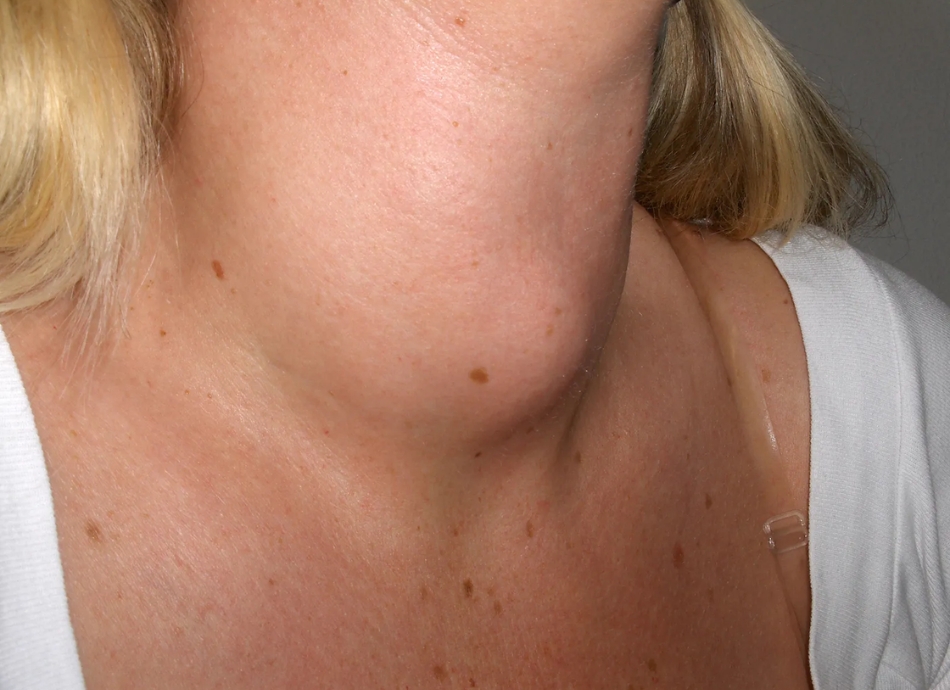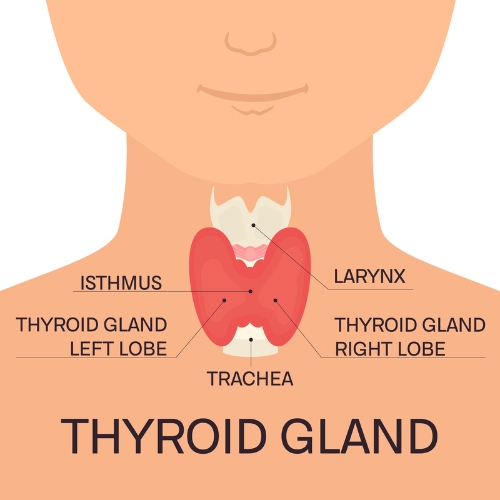Goitre | tenga
Sounds like 'GOI-tur'
Key points about goitre (tenga)
- A goitre is a swelling or enlargement of the thyroid gland in your neck, it doesn't necessarily mean you have cancer.
- If a goitre grows large enough, it can press on your food pipe (oesophagus) or windpipe (trachea).
- Treatment of goitre depends on the cause, size and symptoms.

Your thyroid gland is in the lower front of your neck. It makes thyroid hormone, which is released into your blood and then carried all over your body. Thyroid hormone helps your body stay warm and keeps your brain, heart, and other organs working at the right speed. It’s shaped like a butterfly, with one lobe on either side of your windpipe. When it's normal sized you can’t see it or feel it.

Image credit: Depositphotos
A goitre is a swollen or enlarged thyroid gland. It's more common if you're a woman, 40 years of age or over and if someone in your family has one.
- Iodine deficiency: Iodine is needed for your body to make thyroid hormones. Not enough iodine in your diet can sometimes cause your thyroid gland to enlarge. Iodine deficiency is uncommon in Aotearoa New Zealand, because iodine is routinely added to table salt and other foods such as bread.
- Graves' disease: Graves' disease is an autoimmune disease. Your immune system attacks your thyroid gland, causing it to make too much thyroid hormone. This may result in an enlarged thyroid gland.
- Hashimoto's disease: Hashimoto's disease is an autoimmune disease where your immune system attacks your thyroid gland, causing it to make less thyroid hormone.
- Multinodular goitre: Solid or fluid-filled lumps called nodules develop in your thyroid gland. This results in enlargement of the gland. Read more about thyroid nodules.
- Thyroid cancer: Cancer of the thyroid can cause enlargement in your thyroid gland.
- Medicines: Some medicines can cause thyroid swelling, eg, amiodarone and lithium.
- Pregnancy: Your thyroid gland can get bigger because it needs to make more thyroid hormone when you're hapū.
For most people, the only symptom of a goitre is the appearance of a swelling in your neck. The swelling can be anything from a single small lump, up to a large swelling (mass) at the front of your neck. Sometimes an enlarged thyroid can put pressure on your food pipe (oesophagus) and windpipe (trachea).
This can lead to symptoms of:
- a tight feeling in your throat or neck
- difficulty swallowing food, especially solid food
- cough
- change of voice or hoarseness
- difficulty breathing especially when lying flat on your back
- pain in the area of your thyroid.
If you’re not sure how long the goitre or neck lump has been there, looking back at old photos might help.
Depending on the cause of the goitre, you may make the correct amount of hormones (euthyroid), or have an overactive thyroid (hyperthyroidism) or an underactive thyroid (hypothyroidism).
You, your whānau or your healthcare provider might notice the swelling in your neck. Your healthcare provider will examine your neck and can diagnose a goitre from how the swelling feels and moves when you take a gulp. They will order tests to look for the cause of your goitre which might include:
Blood tests
To check how well your thyroid gland is working, your healthcare provider will order a blood test called a TSH, which is a thyroid function test. If this test shows you could have an under- or overactive thyroid, your healthcare provider will order more blood tests.
An ultrasound of your thyroid
If you have a thyroid nodule, an ultrasound can show whether it’s filled with fluid or thyroid tissue. It can also measure the size of the nodule.
A thyroid scan
During this test, radioactive iodine is injected into a vein in your arm. You then lie on a table while a special camera produces an image of your thyroid on a computer screen.
Biopsy
A biopsy may be needed if there are large nodules in your thyroid gland. A biopsy is when a sample of tissue or cells is taken with a needle to be studied in a laboratory. A biopsy is taken to rule out cancer.
Treatment for goitre depends on the cause of the goitre, how large your thyroid has grown and your symptoms.
No treatment – also called watchful waiting
- If the goitre is small and isn't bothering you, you and your healthcare provider may decide that it doesn’t need to be treated.
- However, the goitre will be closely watched for any changes.
Medicine
- If the goitre is due to a lack of iodine, you may be advised to eat foods high in iodine, such as seaweed, or take iodine supplements.
- If the cause of the goitre is an underactive thyroid (hypothyroidism), your doctor may prescribe levothyroxine. This medicine is the same as the thyroid hormone produced naturally by your body. This treatment is called thyroid replacement therapy.
- If the cause of the goitre is an overactive thyroid (hyperthyroidism), your doctor may prescribe medicines such as carbimazole and propylthiouracil. These medicines stop your thyroid from making too much thyroid hormone.
Radioactive iodine treatment
- If your goitre is caused by an overactive thyroid gland, your doctor may prescribe radioactive iodine. This is taken orally as a liquid or capsule.
- The aim is to shrink your thyroid gland. The iodine goes to your thyroid gland and kills thyroid cells, which shrinks the gland.
- After radioactive iodine treatment, you will also be prescribed thyroid hormone replacement therapy as ongoing treatment.
Surgery
- An operation (surgery) may be performed to remove all or part of your thyroid.
- This is an option if:
- the goitre is large and causes problems with breathing and swallowing
- the goitre has nodules (lumps on it)
- cancer is present.
- Depending on the amount of thyroid gland removed, your doctor may prescribe thyroid hormone replacement therapy as ongoing treatment.
Iodine is needed for your body to produce thyroid hormone. It’s almost impossible to get too much iodine from food. However, if you take too many supplements you can get a goitre which makes too much thyroid hormone. If you have questions about the right amount of iodine for you, talk to your healthcare provider.
The following links provide further information on goitre. Be aware that websites from other countries may contain information that differs from New Zealand recommendations.
Goitre (thyroid swelling)(external link) PatientInfo, UK
Goitre(external link) American Thyroid Association, US
Goitre(external link) Better Health Channel, Australia
References
- Management of thyroid dysfunction in adults(external link) BPAC, NZ, 2010
- Goitre in adults(external link) Auckland Regional HealthPathways, NZ, 2024
Credits: Healthify editorial team. Healthify is brought to you by Health Navigator Charitable Trust.
Reviewed by: Dr Emma Dunning, Clinical Editor and Advisor
Last reviewed:





